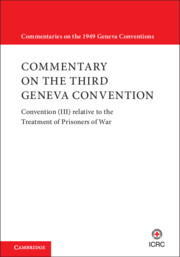 Commentary on the Third Geneva Convention
Commentary on the Third Geneva Convention from Chapter V - Religious, Intellectual and Physical Activities
Published online by Cambridge University Press: 21 August 2021
Article 37 sets the framework for the appointment of a minister ofreligion or qualified layperson to serve prisoners who do not haveaccess to spiritual assistance as a result of the unavailability ofretained religious personnel (Article 35) or of fellow prisoners who areministers of religion (Article 36) belonging to the same faith. In thisway, Article 37 aims to reinforce access of prisoners of war tospiritual assistance and to further guarantee their right to practisetheir religion set forth in Article 34.
To save this book to your Kindle, first ensure [email protected] is added to your Approved Personal Document E-mail List under your Personal Document Settings on the Manage Your Content and Devices page of your Amazon account. Then enter the ‘name’ part of your Kindle email address below. Find out more about saving to your Kindle.
Note you can select to save to either the @free.kindle.com or @kindle.com variations. ‘@free.kindle.com’ emails are free but can only be saved to your device when it is connected to wi-fi. ‘@kindle.com’ emails can be delivered even when you are not connected to wi-fi, but note that service fees apply.
Find out more about the Kindle Personal Document Service.
To save content items to your account, please confirm that you agree to abide by our usage policies. If this is the first time you use this feature, you will be asked to authorise Cambridge Core to connect with your account. Find out more about saving content to Dropbox.
To save content items to your account, please confirm that you agree to abide by our usage policies. If this is the first time you use this feature, you will be asked to authorise Cambridge Core to connect with your account. Find out more about saving content to Google Drive.